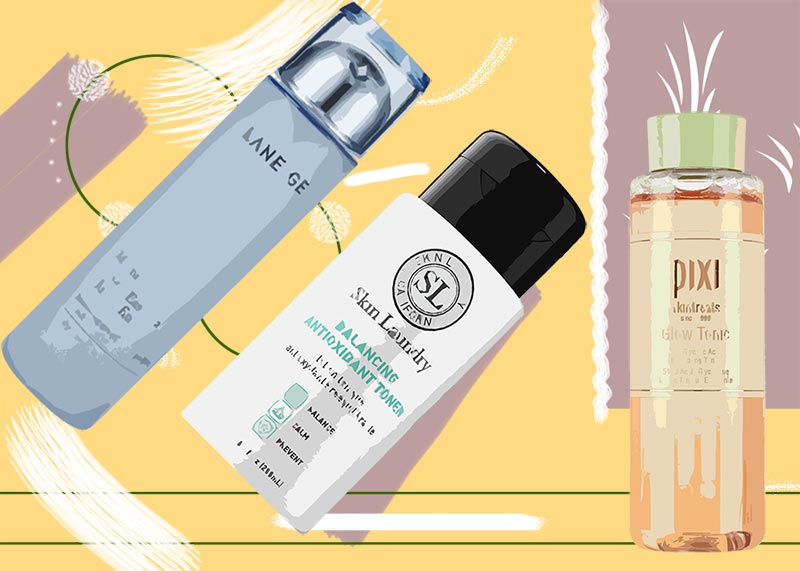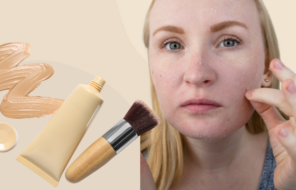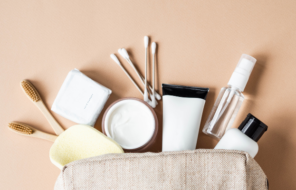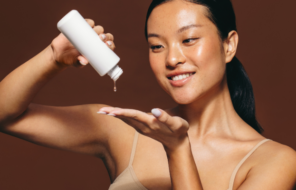Face toners might be the most confusing of traditional skincare products. If you’ve found yourself in the drugstore aisle, holding a bottle of toner and thinking “what the heck?” rest assured you are not alone. Unlike cleansers and facial moisturizers, toners don’t have a readily obvious purpose, just like face mists, so your confusion is warranted. In this article, we’ll demystify toners, explaining what toner is, how it should be used, whether facial toners are mandatory, and all the pros and cons.
In this article:
- What Is Toner?
- Types of Face Toners
- Are Face Toners Really Mandatory?
- Pros of Using Face Toners
- Cons of Using Face Toners
- Face Toners to Avoid
- How to Use Facial Toners?
- Tips & Tricks for Face Toners
What Is Toner?
Toners, occasionally referred to as astringents, are water-based liquid skincare products with a variety of uses. Originally, the purpose of toners was to balance the skin’s pH after cleansing. Since people used to wash their faces with extremely alkaline soap, using a slightly acidic toner was an important step in maintaining skin health.
Nowadays, as many cleansers (all good cleansers) are pH-balanced, toners still hold some beneficial skin properties. They can prepare your skin to absorb any products applied after them, and they themselves can hold extremely beneficial skincare ingredients.
Since toners are so thin, they penetrate into the skin quickly and deeply, so they’re great for delivering active ingredients. Lastly, for those who use acids or acid peels religiously, sometimes balanced skin isn’t enough, and you need an acidic toner to properly prepare your skin.
Types of Face Toners
There are three types of face toners you can choose from, which are:
- Alcohol-Based Face Toners: These are facial toners that contain alcohol, which generally aren’t the best alternatives in the face toner department, unless you have very oily skin.
- Water and Glycerin-Based Face Toners: Glycerin-based face toners are definitely less harmful than alcohol-based ones, however, the scent extracts they contain can still cause harm to your skin, especially if you are allergic.
- Water-Based Face Toners: These are the face toners that you should add to your skincare routine, as they normally are devoid of any harmful ingredients, but instead contain helpful substances that prep your skin for makeup or amp up your daily skincare routine.
Are Face Toners Really Mandatory?
The short answer is no. While they do often show up in those “3-step skincare routines”, there’s actually nothing wrong with a two-step cleanse and moisturizer routine.
However, as you will soon learn, toners can hold many benefits, and they can seriously amp up and improve your current skincare routine. Great toners will never hurt; they will only improve your skin.

Pros of Using Face Toners
- Because toners are so thin, they’re a perfect way of delivering active ingredients to the skin.
- Toners can substitute for cleansers in the morning.
- Toners are absorption enhances, so anything applied after them penetrates better.
- Toners are a great way to boost the hydrating properties of moisturizers.
- Glycolic-based facial toners or ones rich in other alpha hydroxy acids can also prevent ingrown hairs.
Cons of Using Face Toners
- The added skincare routine step can be annoying for minimalists.
- Some people’s skin does not do well with excessive products.
- The wrong toner can harm the skin.
Face Toners to Avoid
So back in the day your average toner would have been somewhere between 30% and 80% alcohol. These facial toners would sting the skin and make it feel super dry.
Some face toners these days still contain large amounts of alcohol (we’re talking bad SD alcohol, not good fatty alcohols like cetearyl alcohol), and you definitely want to avoid them, since alcohol can seriously dehydrate the skin.
In my opinion, DIY face toners from Pinterest recipes should also be avoided. I always tell people do be careful with homemade skin care – their shelf life will never be as long as the shelf life of the products you buy in store, since they don’t contain preservatives.
You will often see ingredients like apple cider vinegar, rosewater, and witch hazel recommended for DIY face toners. With each one of these ingredients, you want to worry about the chances of contamination with bacteria, and specifically with vinegar, the main concern is that it is simply too acidic to be safe for the skin, and at home you don’t have a way of testing.
Witch hazel often contains alcohol, and can dry out the skin, while the rosewater is nice… but it simply doesn’t do much. Once you combine any of these ingredients with anything else, your main concern is product contamination.
How to Use Facial Toners?
You can use a facial toner twice a day, and here are the steps you should follow to use it correctly.
In the evening:
- Cleanse your skin with your favorite cleanser (for most skin types we like Philosophy’s Purity Made Simple Cleanser, which is available at Sephora.) Make sure no cleanser residue is left on your skin.
- Squirt a bit of toner on a cotton round, and use it to wipe your face. It is best to wipe it on in upward motions, against the direction of hair growth, so as to get under the little hairs that grow on the face and have the product penetrate deeper. Some toners come in a spray bottle, so you can simply spray them on.
- Finish of your evening skincare routine with your go-to treatments, serums, and moisturizer.
In the morning:
- Cleansing is optional.
- Like in the evening, you can wipe your face with a cotton pad saturated with toner.
- Finish off your skincare routine with a daytime moisturizer and sunscreen.
Tips & Tricks for Face Toners
- Keep your face toners in the skincare fridge so they can be extra refreshing. There is some research suggesting that by cooling the skin, it will absorb nutrients better.
- Choose a facial toner with exfoliating acids like glycolic, lactic, or salicylic, instead of using harsh physical exfoliants.
- Keep your toner in a spray bottle, for easier use and to save on the cotton pads.
- Apply a spray of toner after finishing your makeup, to achieve a more dewy finish.
- Always apply your toner before using a face mask, if you are going to use one.
Are face toners part of your skincare routine? What do you look for in a toner? Reach out and let us know!
Photos via Sephora, Instagram





